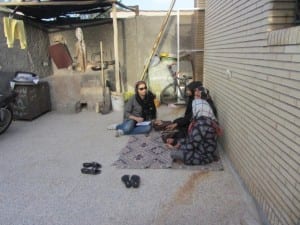Fieldtrip on Organising Post Disaster Reconstruction
By Fatemah Arefian, on 28 June 2013
Even though it is important to understand how reconstruction programmes are organised in order to reduce future disaster risks, there is a gap in theory in that it lacks a conceptual model or analytical framework for understanding and analysing the reality of organising post-disaster reconstruction programmes. I am addressing this gap in theory my PhD research by employing organisation theory in parallel with disaster studies in order to understand organisation design and implementation of the multi-organisational reconstruction programmes, which are participatory, and also aim to contribute to future disaster risk reduction.
In May 2013 I conducted some fieldwork to research the case study of the housing reconstruction programme in Bam (Iran) after the destructive earthquake on 26th December 2003, which killed more than 30,000 people (one third of the population), and destroyed 85% of the buildings. Case study research is an important part of my PhD research. The housing programme in Bam was participatory and gathered many different organisations together from all around the country in order to rebuild 32,000 houses. Having already undertaken pilot interviews, this fieldtrip was mainly aimed at undertaking in-depth interviews with knowledgeable and key people in the organisations involved, at both national and local levels, as well as other organisations related to the programme. During the course of this 34-day fieldtrip I undertook 51 in-depth qualitative interviews, which took a total of around 92 hours.
The challenge of interviewing key people from many different organisations was to track down and access them. As a participant observer at the time of the programme, I personally knew some of the interviewees, but not many of them. Also, the official reconstruction period was a long time ago (3 years, from 2004 to 2006). Some of the interviewees had since moved to other organisations, some had retired since then and some are now high-level managers, making it difficult to arrange interviews. Fortunately my still existing professional/academic network in the country was very supportive and made many more interviews possible that would have been difficult without them.
Local people also were among my interviewees’ list. I wanted to know the life history of the reconstruction of their homes and their experiences. I also wanted to know how the programme was working for different groups of people. The challenge here was to avoid the use of any jargon. The hospitality of the local people of Bam is unforgettable.
|
Interview with local people in Bam |
During the fieldtrip I heard about the practical questions, which must be answered quickly in such chaotic situation of aftermath, and I observed how different answers create different results and experiences.
It was interesting to understand the importance of the accumulated practice-based knowledge, from post-war (Iran-Iraq war, 1980-1988) reconstruction and beyond, in the country. There is a continuum of the experiences of using a range of approaches, and the Bam experience should be positioned within this continuum.
The fieldwork also shed light on the importance of the urban development context, and the influence of existing practices, trends and issues on the formation and implementation of the reconstruction programme. The reconstruction programme in Bam was seen as an opportunity by many organisations to address the existing urban development issues.
This fieldtrip was a milestone in the process of my research. I learned about the formation, and how it worked and evolved from different participant organisations’ perspectives and experiences. It was exciting to understand the emerging themes, overlapping/verifying themes and making sense of the big picture.
I would like to thank the UCL IRDR for financially supporting this fieldtrip.
______________________________________________________
Blog post by Fatemah Arefian, who is a PhD student in the UCL Development Planning Unit and a member of the UCL IRDR
 Close
Close


